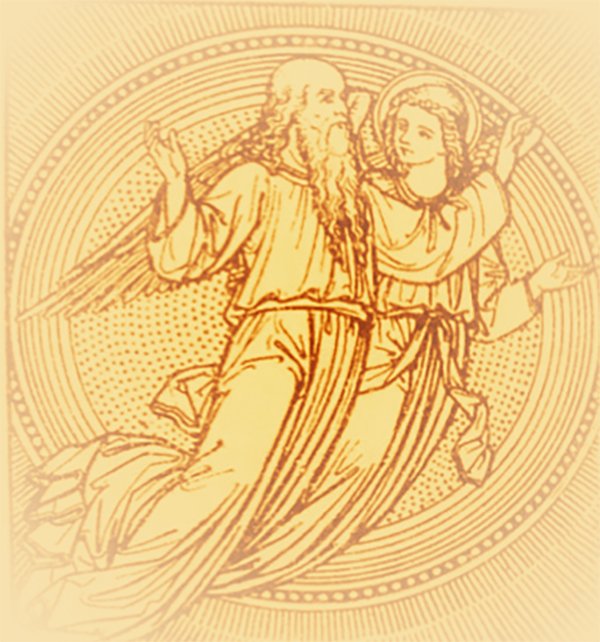On the Hope and Trust in God.
Epistle
Taken from the letter of St. Paul the Apostle to the Ephesians
Eph 5:15-21
Brethren: See to it that you walk with care: not as unwise but as wise, making the most of your time, because the days are evil. Therefore, do not become foolish, but understand what the will of the Lord is. And do not be drunk with wine, for in that is debauchery; but be filled with the Spirit, speaking to one another in psalms and hymns and spiritual songs, singing and making melody in your hearts to the Lord, giving thanks always for all things in the name of our Lord Jesus Christ to God the Father. Be subject to one another in the fear of Christ.
Continuation ✠ of the Holy Gospel according to St. John
John 4:46-53
At that time, there was a certain royal official whose son was lying sick at Capharnaum. When he heard that Jesus had come from Judea into Galilee, he went to Him and besought Him to come down and heal his son, for he was at the point of death. Jesus therefore said to him, Unless you see signs and wonders, you do not believe. The royal official said to Him, Sir, come down before my child dies. Jesus said to him, Go your way, your son lives. The man believed the word that Jesus spoke to him, and departed. But even as he was now going down, his servants met him and brought word saying that his son lived. He asked of them therefore the hour in which he had got better. And they told him, Yesterday, at the seventh hour, the fever left him. The father knew then that it was at that very hour in which Jesus had said to him, Your son lives. And he himself believed, and his whole household.
Homily by Fr. Carlos Zepeda.
“He that dwells in the aid of the Most High, shall abide under the protection of the God of the heavens”.
My dear friends, this is a promise which is given us in Psalm 90. God is asking us to live our lives trusting in Him, to “dwell in the aid of the Most High” Meaning to live our lives in such a way, that we can truly say with St. Paul, “In Him we live”.
This is very relevant when we look at the Gospel today, and the lack of confidence that the father had in Christ’s aid. He did not dwell in the aid of God. He rather came to God, only when he was pushed by the circumstances.
And it is very fitting for this time in our lives, where the world seems to live and act, as if man’s destiny was in our own hands. The pride of man has come to the point of pretending never to die, never to suffer.
We seem to have forgotten the words of our Lord, who said that not a hair will fall from our head, without God’s providence. who said that we cannot add an inch to our stature.
My friends, how beautiful it would be, to dwell in the aid of the Most High!
But to illustrate what these words mean, to know better who it is that dwells in Christ’s loving arms, let us know who are they, that do not dwell in Him. Who are they that do not hope in God?
It is they who trust in temporal goods.
They who trust in their spiritual goods.
Those who despair.
Those who have a vain hope in God, because they lie on false grounds.
First, let us talk about those who put their trust in temporal goods.
It is they whose mind becomes entangled constantly with the cares of money, of success, of vain news and happenings and entertaining in the world.
They wake up thinking of their business or entertainment. They go to sleep enthralled in them. The phone is the first thing they reach out for, the remote is the last thing they let go.
They have forgotten those words of the prophet Isaias, “Seek ye the Lord, while he may be found: call upon him, while he is near.” They forget that this life is to serve God. They do not seek for him, on the time that it is given to them. And they will seek Him out, only when he is no longer there.
He walks away from God’s aid, because he does not believe he needs such things.
What should one do if this fits him?
Give away as many distractions and affections as he can. He should free his life from all such temporal things. Leave the phone away from the room. make the T.V. a thing foreign to the house. Restrain himself from the business and work to only what is necessary. And most importantly, he must put aside time to serve God, in whatever form it seems best. It could be acts of Charity. It could be a particular devotion.
Some put their trust in their own spiritual goods. These are men who are convinced of the power of their intellect, of their knowledge, of their devotions or practices.
In their eyes, they see themselves as the last opinion, the first arbiter of things, the first moral guidance. They are a magisterium.
They struggle to see themselves lower than any other, more ignorant than any other. And while they might see themselves as sinners, they rarely wish to be seen by others as such.
These run the risk of not dwelling in the help of God. Because how can they ask for help, if they don’t firmly believe they need it? Who will ask for guidance, if He thinks himself the better guide? How can they ask for strength if they see themselves as strong?
If the first man was in a bad position, I fear much more for the second. And who among us hasn’t been at one point or another tempted in such ways?
What must this one do?
He must humble himself, and make obedience his daily food and his daily bread. He must seek his perfection in obedience and humble subjection, in the same form that our Lord Jesus Christ was subject himself.
He will find his subjection to God to become perfect, if he becomes as well subject to man.
And how much wealth will he find! when He seeks a job to become subject to man, when he talks to his parents to become subject to man, when he humbly submits and denies his own opinion, before a Priest or a Bishop, to become subject to man!
And in this subjection, he will find himself praying devoutly, and asking for forgiveness and strength from God, and He will dwell also in the aid of the Most High.
Thirdly, there are those who despair, who fall in sadness, who look at the world and its rulers, and forgets that his hope is beyond this earthly creation. These men dwell not in the aid of the Most High, but in themselves. They see their misery. They see their sins. They see their own frailty, and they fail to put their eyes on their savior. Little do they know that the remedy for their sins and falls lies not in their efforts, but in Christ Himself.
What must these do?
They must cease looking at the world and its rulers. They must cease paying attention to the devil and their flesh. They must fill their life with Christ and the saints, and rather than trusting in their own feeble efforts, they must strive to put Christ’s presence in their lives, by reading, by humble prayer, by love.
These must fill their life with the Sacraments and put as much care as they can to receive them well. For then, in the sacraments, it is not their strength that will bring them up, but the strength of Christ.
And finally, there are those who flatter themselves, thinking that they dwell in the aid of the Most High, but do not keep the commandments. They do not care for what the Church teaches, they live their lives in a so-called “freedom” which is nothing else but the freedom to do evil, to abandon the fear of the Lord.
These presume that God will submit to their lives, rather than submitting their lives to God. they believe there is no need to learn what God has commanded, but rather expect that God has no expectations and no commandments. They put a muzzle on God, and they speak loudly their opinion. Their hopes are vain and empty. Because their hope is not rooted in the love of God. Of these, St. Bernard says “damned is him, who sins in vain hope”
What must this one do?
He must fear the Lord. He will acknowledge that he has not created himself, He is not his owner and maker. There is another who owns him, and who has rights over him.
Let him rejoice in discovering the law of his maker. Let him rest in the fear of the Lord. Let Him realize at once that it is in his keeping the law of Christ that he will find rest, peace, happiness, and goodness.
Let us see finally my friends, one who dwelled in the aid of the Most High.
It is said of St. Francis, that when He was dying, he was so happy, he couldn’t stop singing. One of His friars came up to Him and told him, “Father, you should not sing like that. People will be disedified. What will they say? They know you preach penance, and they will expect you to be shedding tears at your deathbed, not singing!”
But St. Francis explained to him that he could not but sing, for he trusted so much in the Mercy of Christ, whom He loved and serve, that he could not but expect that He would have mercy on his soul.
This man put his trust, not in the earthly goods of this world, but in serving God throughout his life.
He did not trust in his merits, but was always a humble subject, even though he had founded an order, even though he had Christ’s wounds on his hands and feet.
He did not look at himself, at his miseries at sins, but only to look at Christ immediately afterward.
And he did not hope in vain, because He changed his ways, and lived his life wishing to fulfill God’s law.
My dear friends, let us then, once again, put away from our lives those things that rob Christ of our hearts.
Let us make it a priority to say our prayers, to do good works, to serve God in this life. That our hopes may not be in vain.
Let it be, that in our lives, we may apply this beautiful promise:
“He that dwells in the aid of the Most High, shall abide under the protection of the God of the heavens”. (Psalm. 90)



